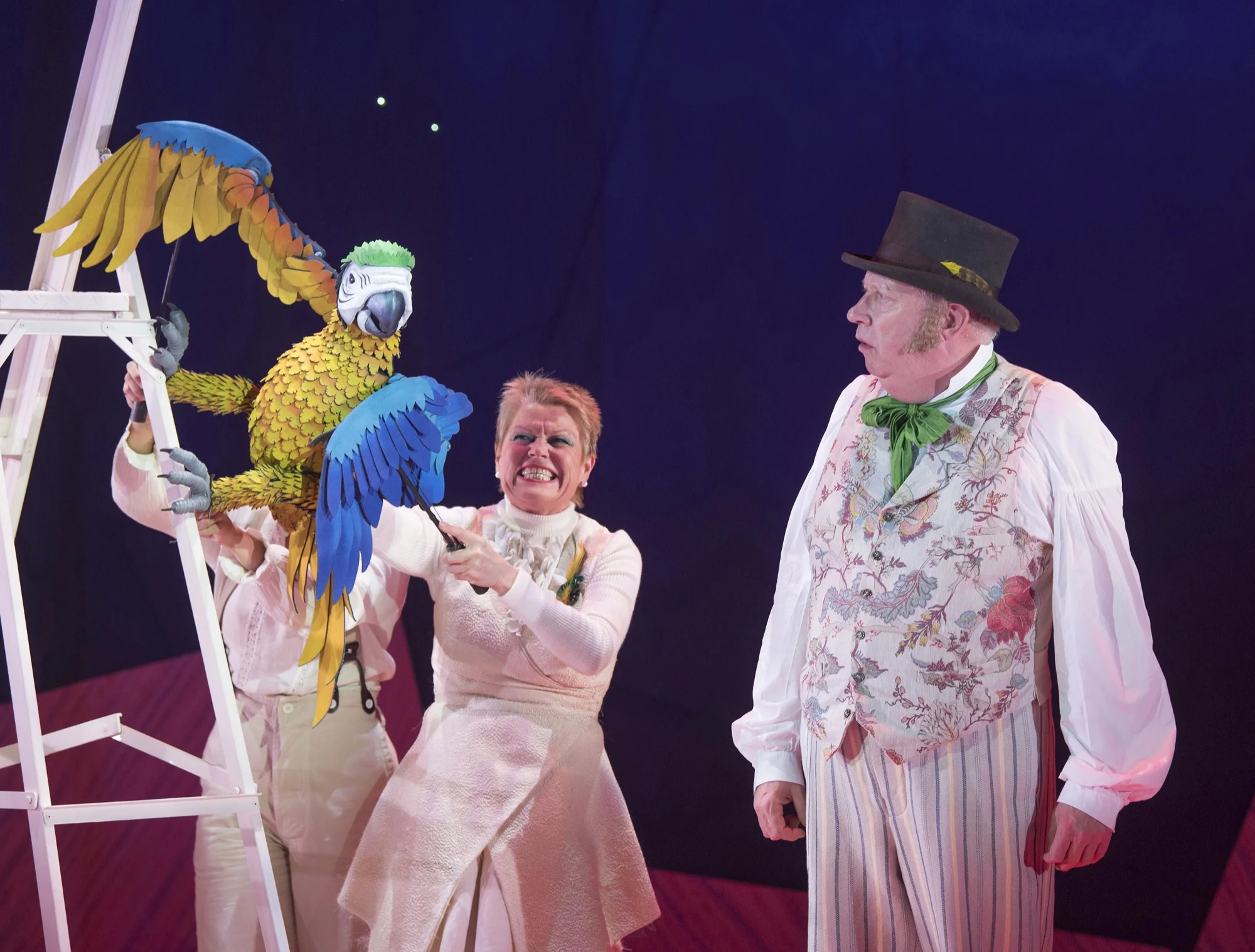On Your Feet
Gloria Estefan talks to The Cheshire Magazine about her illustrious career with husband Emilio and their smash hit musical coming to Manchester directly from Broadway this autumn.
What have you been most pleased with about how On Your Feet! has been received?
Simply that people seem to love it. There’s actually a group of fans called The Feeties, who are teenage girls or in their early 20s who have seen it, like, 100 times. And there are others who have written to say they were entertained or cried or were reminded of different times in their lives through the songs. That’s the point of the show - to connect with people on a very human level, which is what we’ve always tried to do through our music. It’s been phenomenal. It makes grown men cry. [Laughs] Personally, seeing grown men cry is my favourite thing. I also love how it surprises people. They go in expecting one thing and they come out feeling everything we’d hoped, which is a connection and having been on an emotional journey besides just the pure entertainment of the music and what they already know about us.
Has any dramatic licence been taken with true-life events?
It’s all true, although maybe not always at the moment you see it happening on stage, and some of the songs aren’t in chronological order - they’ve been moved around to suit the story. The only thing that’s not true is Emilio having a six-pack, as he does in the show. [Laughs] It’s in there somewhere but washboard abs he does not have.
How involved were you in developing the script with writer Alexander Dinelaris?
We spent a year and half talking it through with him, then he said ‘You guys are a nightmare to write for because there’s no conflict’. My reaction was ‘Really? Let me introduce you to my mother!’ I loved and adored her but she was very rough on Emilio for the first 12 years of our marriage. She was the protective Cuban mum thinking ‘Gloria’s going off with a musician, is he marrying her for her or for her voice?’ The book that Alex has done is spectacular. Of course once a director gets involved they shape things, but Alex is a phenomenal writer and we’re lucky that we hired him before he won the Oscar [for Birdman]. As well as scheduling issues, he’d have been way more expensive!
Is it strange seeing yourself played by someone else?
It was weird at the beginning, I’ve gotta say, but it’s an early version of me so it’s cool. And I’d never say ‘Hey, do it this way’, I just give as much backstory as I can rather than have someone try to clone me. I’m probably the worst judge of who I am because I’m inside myself, not on the outside looking in, and so I don’t know how I come off to other people.
Have you learned anything about, say, your habits and quirks from watching it?
Not really because they whisk through it so fast they don’t have time for habits. What’s impressive to me is how much love and devotion anyone who has played me in the show so far has put into it and how much they identify with me. These have mostly been Cuban-American girls so they’re kind of telling their own story too and that makes me very happy and proud of them.
How has it been bringing the show to the UK?
“It’s been fantastic. The cast is amazing. Christie Prades, who was in the original Broadway production, has been loving it because she has a whole different energy to play off. The book is brand new to the English cast and the acting choices they’ve made are spectacular. And Philippa Stefani, who is performing at certain shows in London and is headlining the UK tour, is just wonderful.”
What are you most proud of about your career as it’s depicted in the show?
That we stayed true to who we were. What I tell every young artist is ‘They’re gonna try and change you’. One time they even told Emilio ‘Lose the singer!’ because it was the time of bands with male leads. Yes, Fleetwood Mac had two female singers but they also had male singers and yes, there was Madonna and Cyndi Lauper but that was a new thing in music. The record company even told Emilio to get rid of the horns and the percussion section. But we said ‘This is who we are’ and we fought to stay true to that. I’m proud that we were able to manoeuvre our way into the business without compromising. I remember saying ‘I can deal with failure if it’s something you really believe in but dealing with success when you’re making music you don’t like or that’s not true to you is gonna be really hard’. We stuck to our guns and learned we’re our best cheerleaders.
What’s the most fun number in the musical?
There’s a couple of really big numbers. Tradición is spectacular and then of course there’s Conga, where you literally see how it grows and grows then explodes in joy and includes the audience in it.
And what’s the most poignant song in the show for you?
Most definitely the one I co-wrote with my daughter Emily called If I Never Got To Tell You, which in the play is when my mother comes to visit me in hospital after the tour bus accident. My daughter couldn’t be in the show because she hadn’t been born during the timeframe. I tried to wedge her in there somewhere in any possible way and then she ended up being in it in a very natural, beautiful way through the only original song written specifically for it. It’s a very poignant song because it’s my mum telling me the things she wished she’d told me. She hadn’t spoken to me for two years after I took my sister on the road with me. She’d been punishing me for that.
Have you changed any of the songs?
I’ve done a lot of layers and added new things to old material. With Mi Tierra I’ve done some English language ad-libs because I don’t want to lose the non-Spanish-speaking audience. I want them to know what’s being sung because it’s advancing the story. I also rewrote some words for a song called Famous because of where it comes in the narrative.
You have a huge LGBTQ following. Have you encountered any drag queen Glorias over the years?
“Of course! I love them. They’re far more fabulous than I ever could be and far more out-there. The other day in Miami a friend of mine had her bridal shower at a drag brunch. When we walked in the drag queen who was headlining went ‘Oh my God, the patron saint of drag queens has just walked
through the door’. That’s one of my favourite introductions ever. We ended up doing the Conga with them and it was a blast.”
When did you first get hooked on music?
I was just four or five years old. I was actually quite shy but music was my love and it would transport me. The old Cuban standards were always playing in our house and I sang as soon as I could talk. Music was big in our household. My mother performed in school shows and she won a contest to do the Spanish dubbing for Shirley Temple’s films, but her father wanted her to pursue an academic career instead. And my own father had two brothers who sang and played guitar. So I guess music was in the gene pool. Then I started listening to the British Invasion. I remember pulling into a laundromat parking lot with my mother and hearing Ferry Cross The Mersey. My hair stood on end and I didn’t want to get out of the car, I was so enraptured. That song really is like a Bolero in its rhythm. British bands were listening to a lot of Latin music and The Beatles recorded Besame Mucho. All that mixing of sounds had a huge impact on me and I had all this musical vocabulary to draw from.
You met and began working with Emilio in 1975. Did you know back then you were on to a winning thing?
I’m a bit psychic and early on I remember telling Emilio ‘I think we’re gonna be famous and I think we’re gonna be famous all over the world’. I believed so strongly in the music and I didn’t know how it was going to happen but I just knew something was gonna happen.
As you say, Conga is one of the high points of On Your Feet! When you released it in 1985 did you realise it’d be such a huge hit?
Yes, I did. It was written when we were travelling from Holland to England as part of the Dr Beat promotional tour and when we got home we began performing it in our live shows even before we’d recorded it. People were reacting to it as if it was already a hit so we knew we were onto something. Funny thing is, it didn’t do well in the UK because Black Lace’s Do The Conga came out before our song did.
What prompted the decision to go from Miami Sound Machine to Gloria Estefan and Miami Sound Machine, then just Gloria Estefan?
That was Emilio’s idea. I didn’t want him to add my name to the band because we were successful and I was happy with my bandmates, nor did I want it to be just ‘Gloria Estefan’. But he was like ‘People are identifying with you, they think you’re beautiful and sexy, they need to know your name’.
It sounds like he doesn’t have a big ego…
Exactly. That’s why we’ve been able to have a successful marriage and a successful career. He does what’s best for the artist and that’s why people love working with him. With a lot of producers you have to get past their ego but he finds what’s special about them, he finds amazing music and then he makes it happen for them. He doesn’t need the accolades.
How was it being hailed as a 1980s sex symbol?
That was tough for me. I never hid the fact I was married and had a kid [son Nayib] and growing up I never felt sexy at all. But I learned to embrace what people felt was sexy and that seemed to stem from allowing people to see who I was and how music made me feel. I think that’s a sexy thing, when someone is confident and you can tell they believe in what they’re doing.
The show illustrates just how varied your music has been…
That was always the intention. The tricky thing is that the business wants you to continue with more of the same. Our biggest challenge when we put out Conga and it was so massive was that we wanted to release Bad Boy second and the record company went ‘But it sounds completely different’. We went ‘Exactly’ and talked them into it. Then we wanted to release Words Get In The Way and they went ‘But it’s a ballad!’ But we thought ‘If we don’t take this risk now we’re gonna be locked into this dance thing’. After that song become huge it freed us up but yes, every time you create something you can’t let it paralyse you. You have to move forward.”
When putting together On Your Feet! how tough was it for you to revisit the 1990 bus crash that could have ended your career?
It’s strange because I remember more the aftermath than the actual crash. I’ve spoken to a lot of people who have also been involved in accidents and they agree there must be some mechanism in our brains or our spirits where you remember before and after but you don’t remember the actual moment of impact. I was awake for it and afterwards, as I lay on the floor, I was in so much pain I was praying I’d faint but I never did. I remember everything except the actual breaking of my back.
What got you through the painful process of rehabilitation?
I grew up taking care of my wheelchair-bound father so I knew what my family might have to face with me. I didn’t care about getting back on stage. I just wanted to be independent and walk again. I said ‘OK, if I end up in a chair I’ll figure out a way to deal with it but I am gonna fight my hardest for that not to happen’. Then I started getting all these letters from people. They kept throwing the song Get On Your Feet back in my face and I said to Emilio ‘I never did this for the fame so what if this is the sole reason I became famous? What if I have the opportunity through my perseverance to somehow inspire people?’ I rehabbed like six or seven hours a day, first in the pool because I couldn’t walk, and I had biofeedback - attaching electrodes to the muscles so they wouldn’t die.
How did it feel when you first performed on stage again?
Oh my god, it was euphoric. It was how I imagine climbing Mount Everest would feel. I had overcome so many obstacles and I’d worked so hard. It was just amazing.
Now with your story being retold on stage, have people mentioned to you about how it has inspired them?
They have and it’s wonderful. There was a man who ran a company with 20 employees. He told me: ‘My wife took me to your show on a Broadway weekend and I went along reluctantly because it was the fifth show and I was Broadway-ed out. But because of your show I now have a 60-person
company because I’d given up on my dreams of making it bigger, then seeing it really inspired me.’ Another person wanted to start a swim programme for special needs students but they’d never gotten around to it, thinking ‘This is never gonna happen’. Then they started it after seeing the show and it’s been incredibly successful.
On Your Feet is playing at Manchester Palace Theatre from Monday 28th October - Saturday 2nd November. For tickets please go to www.atgtickets.com
Hungry for more?
Read up on the latest news, delicious eats, travel treats and seasonal style trends in FEATURES, or browse a curated selection of our FEATURED PRODUCTS, meander through our guide to the finest things to do in Cheshire and beyond in WHATS ON or partake in our COMPETITIONS.
About The CHESHIRE Magazine
We are the definitive guide to luxury lifestyle in the North West. Latest news, delicious eats, travel treats and seasonal style trends. The Cheshire Magazine is the largest luxury lifestyle title for the North West of England, dropping directly through the letterboxes of VIP subscribers from the Wirral to Greater Manchester plus all the villages and towns in between and digitally available as a subscription in print and digital on issuu.com worldwide. We specialise in connecting luxury brands to likeminded consumers.
If you are interested on how you can partner with The CHESHIRE Magazine, read more about us. Or get in touch to find out more about marketing, featuring or partnering with the Cheshire Magazine in print or online.
















